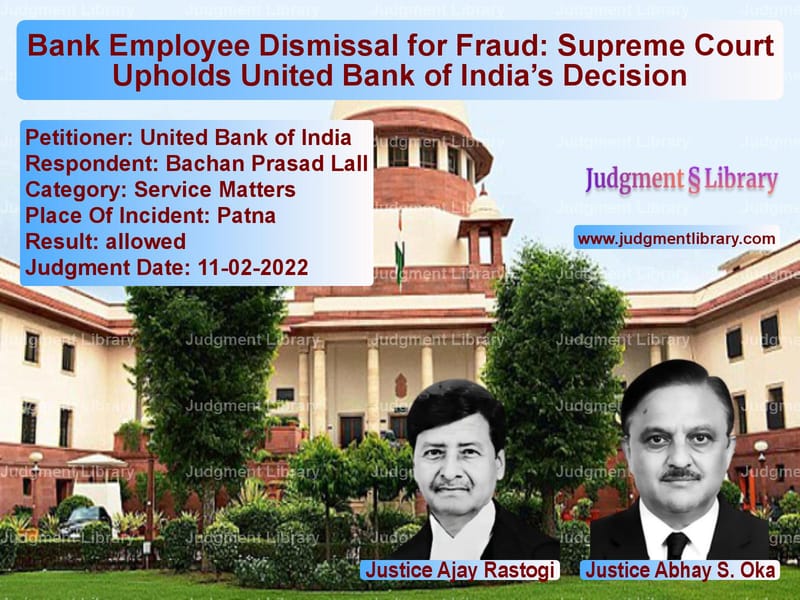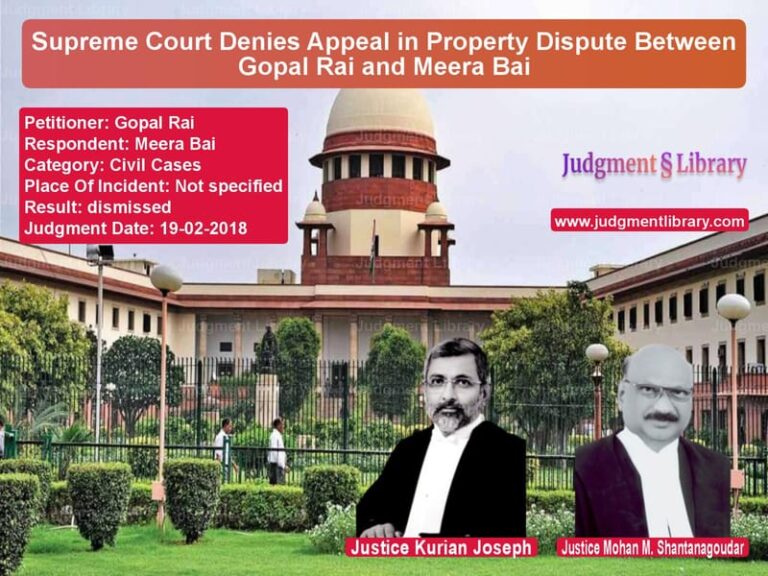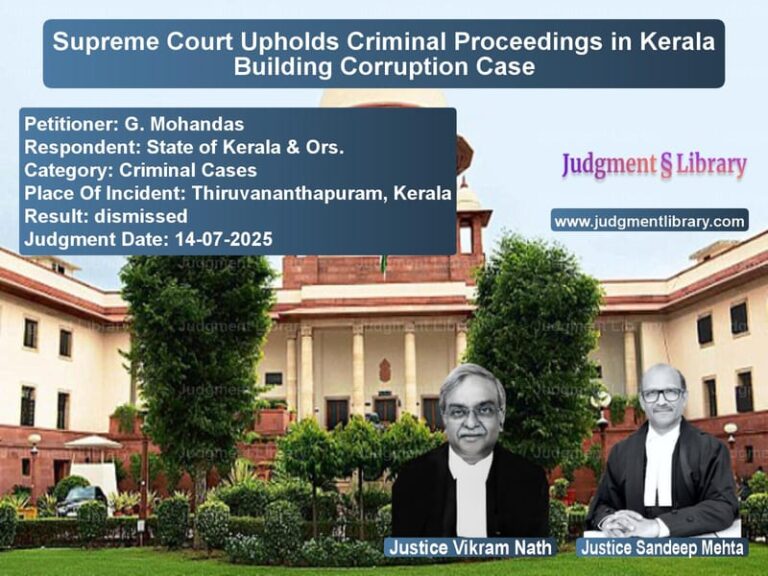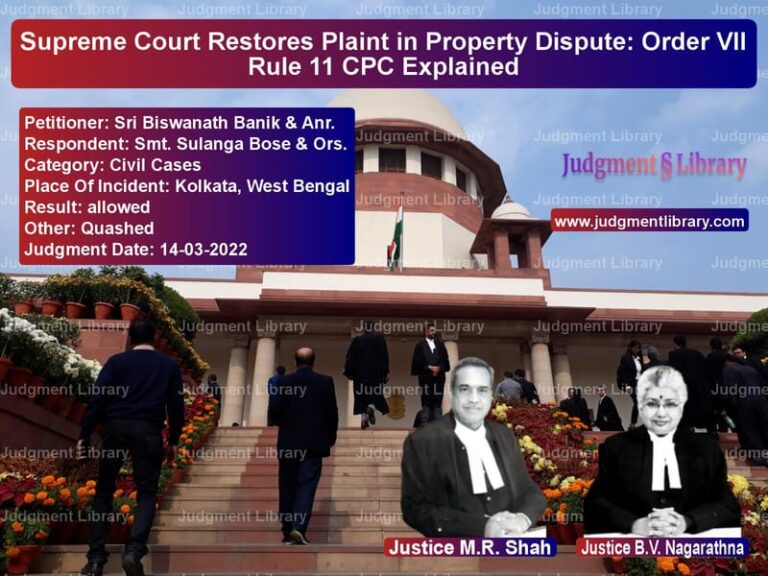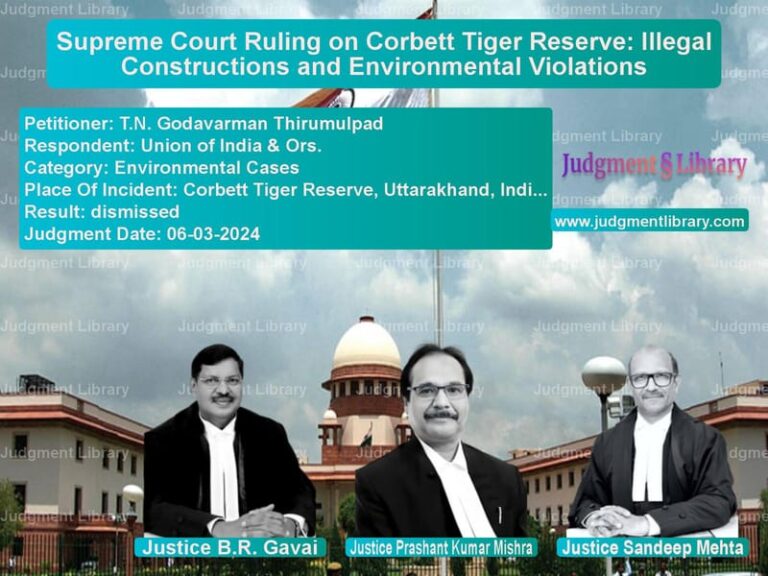Bank Employee Dismissal for Fraud: Supreme Court Upholds United Bank of India’s Decision
The case of United Bank of India vs. Bachan Prasad Lall deals with an important legal question concerning employee misconduct, fraudulent financial transactions, and the extent of judicial intervention in disciplinary proceedings. The Supreme Court of India, in this case, upheld the dismissal of a bank employee accused of financial fraud, setting a precedent on how such misconduct should be handled within banking institutions.
Background of the Case
The respondent, Bachan Prasad Lall, was employed as a Clerk-cum-Typist at the United Bank of India in 1973. During his service, he was found guilty of committing serious irregularities in financial transactions. On August 7, 1995, he was placed under suspension, and on March 2, 1996, he was served with a charge sheet detailing allegations of fraudulent activities.
Following a disciplinary inquiry, the charges against him were proven, and he was dismissed from service on December 6, 2000. His appeal against the dismissal was rejected on April 24, 2004. The matter was subsequently referred for adjudication under the Industrial Disputes Act, 1947, leading to judicial intervention.
Allegations Against the Employee
The charges against Bachan Prasad Lall included:
- Preparation of nine fraudulent credit transfer vouchers amounting to Rs. 53,465 without proper details.
- Depositing these funds into a savings account in the name of Smt. Asha Devi, which was later found to be fictitious.
- Forging signatures on withdrawal slips to withdraw money from this account.
- Manipulating bank records to hide these fraudulent transactions.
The inquiry found that the employee had systematically diverted funds using fictitious accounts, proving his involvement in financial fraud.
Tribunal’s Decision
The Tribunal, after reviewing the case, agreed that the charges were proven. However, it used its discretionary power under Section 11A of the Industrial Disputes Act, 1947, to alter the punishment. Instead of dismissal, the Tribunal ordered:
- Reinstatement of the employee with a reduction of two stages in his basic salary.
- Non-payment of salary and allowances during the suspension period, except for subsistence allowance.
High Court’s Verdict
The United Bank of India challenged this decision in the High Court, arguing that an employee found guilty of fraud should not be reinstated. The High Court, however, upheld the Tribunal’s ruling, stating that while the employee’s misconduct was serious, he had already reached the age of superannuation in 2007, making reinstatement a non-issue.
Supreme Court’s Judgment
The Supreme Court took a strict stance against financial fraud within banking institutions and reversed the High Court’s decision. The key observations made by the Court were:
“The nature of allegations against the respondent employee was of fraudulently preparing nine credit transfer vouchers and crediting the whole amount to one savings account opened in the name of one Smt. Asha Devi, an admittedly fake account prepared by the respondent employee.”
The Court further emphasized:
“The Bank employee always holds the position of trust where honesty and integrity are the sine qua non, and it would never be advisable to deal with such matters leniently.”
Key Supreme Court Directives
- The interference made by the Tribunal in reducing the punishment was unjustified.
- The employee’s fraudulent actions warranted dismissal, regardless of his superannuation status.
- Judicial leniency should not be applied in cases involving financial fraud.
Implications of the Judgment
This ruling has significant implications for banking institutions and disciplinary actions against employees:
- Zero tolerance for fraud: The judgment reinforces the principle that financial fraud in banking services must be dealt with strictly.
- Judicial restraint in disciplinary actions: Courts and Tribunals should not interfere with employer-imposed penalties unless they are “shockingly disproportionate.”
- Accountability in financial institutions: The ruling ensures that employees engaged in fraudulent activities cannot escape punishment on procedural grounds.
Conclusion
The Supreme Court’s decision in United Bank of India vs. Bachan Prasad Lall serves as a critical reference point for financial institutions dealing with employee misconduct. The ruling upholds the principle that fraud cannot be tolerated in the banking sector and that those engaging in such activities should face the strictest penalties. The judgment ensures that disciplinary authorities retain their authority in maintaining integrity within financial institutions.
Petitioner Name: United Bank of India.Respondent Name: Bachan Prasad Lall.Judgment By: Justice Ajay Rastogi, Justice Abhay S. Oka.Place Of Incident: Patna.Judgment Date: 11-02-2022.
Don’t miss out on the full details! Download the complete judgment in PDF format below and gain valuable insights instantly!
Download Judgment: united-bank-of-india-vs-bachan-prasad-lall-supreme-court-of-india-judgment-dated-11-02-2022.pdf
Directly Download Judgment: Directly download this Judgment
See all petitions in Disciplinary Proceedings
See all petitions in Public Sector Employees
See all petitions in Termination Cases
See all petitions in Judgment by Ajay Rastogi
See all petitions in Judgment by Abhay S. Oka
See all petitions in allowed
See all petitions in supreme court of India judgments February 2022
See all petitions in 2022 judgments
See all posts in Service Matters Category
See all allowed petitions in Service Matters Category
See all Dismissed petitions in Service Matters Category
See all partially allowed petitions in Service Matters Category

